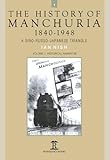The History of Manchuria, 1840-1948 : A Sino-Russo-Japanese Triangle / Ian Nish.
Material type: TextSeries: Renaissance Books Asia Pacific SeriesPublisher: Amsterdam : Amsterdam University Press, [2016]Copyright date: ©2016Description: 1 online resource (736 p.)Content type:
TextSeries: Renaissance Books Asia Pacific SeriesPublisher: Amsterdam : Amsterdam University Press, [2016]Copyright date: ©2016Description: 1 online resource (736 p.)Content type: - 9781898823438
- 915.8035
- online - DeGruyter
| Item type | Current library | Call number | URL | Status | Notes | Barcode | |
|---|---|---|---|---|---|---|---|
 eBook
eBook
|
Biblioteca "Angelicum" Pont. Univ. S.Tommaso d'Aquino Nuvola online | online - DeGruyter (Browse shelf(Opens below)) | Online access | Not for loan (Accesso limitato) | Accesso per gli utenti autorizzati / Access for authorized users | (dgr)9781898823438 |
Frontmatter -- Contents -- Preface -- Acknowledgements -- Name Conventions -- Boundaries of Fengtien Province of China (1895-1945) -- List of Abbreviations -- Major battles of the Russo-Japanese War, 1904-05 -- List of Maps -- Railways and railway plans for Korea and North China, December 1927 -- VOLUME I: Historical Narrative -- Chapter 1: Manchuria and Russian Ambition, 1840s-1890s -- Chapter 2 : The Sino-Japanese War and After, 1894–1900 -- Chapter 3: Prelude to the Russo-Japanese War, 1900–1905 -- Chapter 4: Railways, Reforms and Revolutions, 1906–1914 -- Chapter 5: Wartime Turmoil in Manchuria, 1915–1922 -- Chapter 6: Chang Tso-Lin’s Manchuria, 1922–1928 -- Chapter 7: Chinese Nationalism and Foreign Railways, 1919–1931 -- Chapter 8: Lytton Commission in Manchuria, 1931–1932 -- Chapter 9: Manchukuo: From Republic to Empire, 1933–1937 -- Chapter 10: A Decade of Wars, 1938–1948 -- Epilogue -- Select Bibliography -- Index -- Front Matter 2 -- Contents VOLUME 2 -- VOLUME 2 : SELECT PRIMARY SOURCES -- Chapter 1: 1840–1894 -- Chapter 2: 1895–1899 -- Chapter 3: 1900–1905 -- Chapter 4: 1905–1914 -- Chapter 5: 1915–1922 -- Chapter 6: 1922–1928 -- Chapter 7: 1929–1931 -- Chapter 8: 1931–1932 -- Chapter 9: 1933–1937 -- Chapter 10: 1938–1948 -- Appendix
restricted access online access with authorization star
http://purl.org/coar/access_right/c_16ec
In A History of Manchuria, Ian Nish describes the turbulent times which the three Northeastern Provinces of China experienced in the last two centuries. The site of three serious wars in 1894, 1904 and 1919, the territory rarely enjoyed peace though its economy progressed because of the building of arterial railways. From 1932 it came under the rule of the Japanese-inspired government of Manchukuo based at Changchun. But that was short-lived, being brought to an end by the punitive incursion and occupation of the country by Soviet forces in 1945. Thereafter the devastated territory was fought over by Chinese Nationalist and Communist armies until Mukden (Shenyang) fell to the Communists in October 1948. Manchuria, under-populated but strategically important, was the location for disputes between China, Russia and Japan, the three powers making up the 'triangle' which gives the name to the sub-title of this study. These countries were hardly ever at peace with one another, the result being that the economic growth of a potentially wealthy country was seriously retarded. The story is illustrated by extracts drawn from contemporary documents of the three triangular powers.
Mode of access: Internet via World Wide Web.
In English.
Description based on online resource; title from PDF title page (publisher's Web site, viewed 29. Mai 2023)


